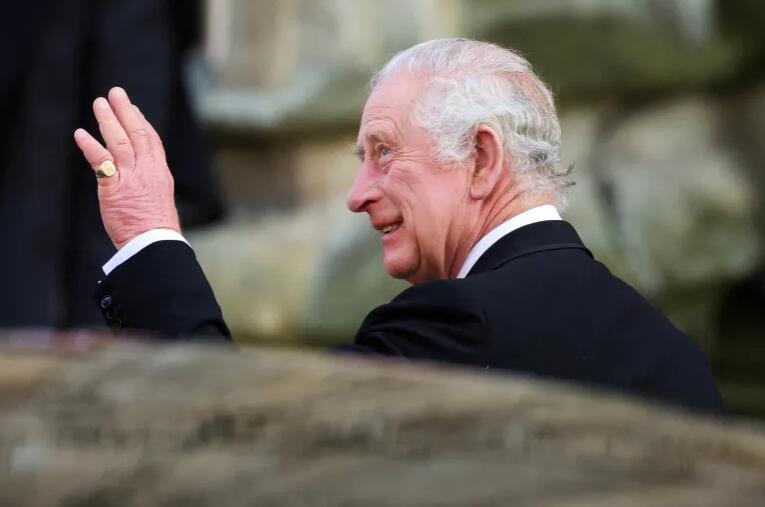As the United Kingdom prepares for the coronation of King Charles III, more than 5,000km (3,100 miles) away, in the largest country in the British Commonwealth, a celebration will be held to usher in “a new chapter”.
Set to coincide with the king officially taking the crown at London’s Westminster Abbey on Saturday, the Canadian government is hosting an event in the capital, Ottawa, to welcome the new British monarch as Canada’s head of state.
“His Majesty has a long history and a special relationship with Canada, and we look forward to celebrating his Coronation in May,” Canadian Prime Minister Justin Trudeau said in a statement announcing the event.
But despite the government’s plans, King Charles III’s coronation has been largely met with a collective shrug in the North American country of about 38 million people – evidence, experts say, of a declining view of the British monarchy amongst most Canadians.
“A majority at this point in this country clearly seems to think the time has come to move on. Whether that will happen is another story, but that is certainly the sentiment,” said Philip Resnick, a professor emeritus of political science at the University of British Columbia.
“Which is why there’s none of the fervour and excitement that might have been surrounding this event,” he told Al Jazeera, adding that the monarchy is viewed as a relic of “another era” in the eyes of many. “The sense is that, ‘Charles, what does it have to do with us?’”
Growing questions
While it is a parliamentary democracy, Canada also is a constitutional monarchy and the UK monarch acts as its head of state.
The British Crown has a largely ceremonial representative in Canada – the governor general – whose duties are outlined in the Canadian Constitution and include overseeing the armed forces, suspending Parliament ahead of elections, and giving “royal assent” to bills passed in the House of Commons and the Senate.
Meanwhile, the country, which joined the British Commonwealth in the early 1930s, has enjoyed decades of warm relations with the British royal family, especially the late Queen Elizabeth II, who made 22 official visits to Canada during her reign and was widely respected.
So, it was little surprise that following the queen’s death in September of last year, Trudeau’s government expressed support for her son and successor, King Charles III.
But that recognition came amidst a growing push in Commonwealth realms, particularly in the Caribbean, to cut ties to the monarchy after Queen Elizabeth II’s passing, and recent opinion polls have shown that a majority of Canadians are less than enthusiastic about King Charles III’s tenure.
In April, the Angus Reid Institute found that three in five people in Canada were against recognising his reign. More specifically, 64 percent said they were against swearing an oath to King Charles at some official ceremonies and singing “God Save the King” at official ceremonies, while 62 percent were opposed to putting his face on Canadian currency, the poll said.
A month earlier, a separate Leger Marketing poll (PDF) found that 67 percent of Canadians said they were indifferent to Charles taking over as king last year, and 81 percent said they were unattached to the monarchy.
Seventy-three percent of respondents also said they were uninterested in the king’s coronation, while 56 percent said they did not know it was on May 6.
Political will
While “ambivalence is the dominant sentiment” ahead of the coronation, according to Damien-Claude Belanger, an associate professor of history at the University of Ottawa, Canada is still a long way from breaking from the British monarchy.
Cutting ties would involve gaining the approval of all 10 Canadian provinces, as well as both houses of Parliament, Belanger explained.
“We don’t give much thought to the Crown, but the Crown is everywhere [in Canada], constitutionally speaking,” he said. “And again you can’t just abolish the monarchy; something has to replace the executive authority that’s vested in the Crown.”
Though the queen’s death prompted an effort by politicians from the French-speaking province of Quebec – where opposition to the Crown runs deepest – to sever ties to the monarchy, a parliamentary motion to that effect was overwhelmingly rejected in October.
Most major Canadian political parties, including Trudeau’s Liberals, are unwilling to take the issue forward, said Belanger, in large part because it means having “to renegotiate our entire constitutional order” and put everything on the table.

“I would say that the Liberal Party is too attached to the Canada that was created in 1982” when the Canadian Constitution Act was passed “to want to take the chance to rejig that”, Belanger told Al Jazeera.
“[Trudeau] is attached to the system that was created in 1982 and he does not want to change that. And so implicitly that makes him, because he’s in favour of the status quo politically, a monarchist.”
‘Colony to nation’
Resnick agreed that part of the political reticence in Canada around formally breaking with the British monarchy stems from fears that “opening up” the Constitution to do it could be a slippery slope, with provinces demanding constitutional changes on other issues.
But he said if Australia – where a referendum on becoming a republic and replacing the queen as head of state failed in 1999 – moves forward with plans to put the issue to a vote again in the coming years, that could put pressure on Canadian legislators.
“If Australia were to go this route … and if they were to vote ‘yes’, that would put a much stronger emphasis to do the same in Canada,” he said.
Resnick said that while figuring out what republican system Canada could put in place after the British monarchy is removed will be important – pointing to the German model as a good option – “the first issue is whether or not people want to make the change”.
He likened the current moment to when Canada replaced its flag in the 1960s, moving from what was known as the “Red Ensign”, which sported a Union Jack in the corner, to one with a red maple leaf at its centre that is still used today.
“People were screaming and yelling about tradition and [saying] Canadians fought world wars under this flag,” Resnick said. “I’ve never heard anyone say, ‘Let’s go back to the Red Ensign.’”
Today’s debate, he told Al Jazeera, is essentially “the last bit of unfinished business from colony to nation” – and being a sovereign country means having your own head of state.“The majority now feels it’s time to just move on,” Resnick said.

